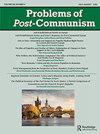Sustainable Development and Actors of Regional Environmental Governance: Eurasia at the Crossroads
IF 2
2区 社会学
Q2 POLITICAL SCIENCE
引用次数: 7
Abstract
The year 2022 has witnessed highly turbulent changes in all aspects of world politics and socioeconomic development, directly affecting global environmental politics and posing new challenges to the sustainable development agenda. This concluding essay places the articles of this special issue into this new dynamic global context, accounting for the rising importance of new actors and changes in regional environmental governance in Eurasia. How has the international security crisis triggered by the Russo-Ukrainian war affected sustainable development in Eurasia? What are the implications and lessons (if any) for environmental regional governance? It is safe to suggest that many issues—including public commitments and perceptions, the priorities of governments around the world, an actual increase in the risk of nuclear destruction, the ecological consequences of the war, the energy crisis in Europe, among other factors—have all modified the state of the prewar environmental agenda. Two new articles in this special issue, by Lada Kochtcheeva (2021) and Eva-Marie Dubuisson (2020), have been welcome additions to the collection, shedding ample light on the state of sustainable development prior to the events of 2022 and on the importance of Eurasia in the context of regional environmental governance. Moreover, both articles allow us to make tentative predictions regarding the future prospects of environmental politics, public environmentalism, and the role of regional international organizations (IOs). Kochtcheeva (2021) looks at the importance of international influence in shaping Russia’s stance in global environmental politics and the importance of global image-building for the Russian government before 2022. Among other things, she argues that international influence has been one of the most crucial factors in making Russia’s government more pro-environmental. Similarly, Dubuisson (2020) looks into the nexus of international influence between the United Nations (UN), the Kazakh government, and people in Kazakhstan. Both papers are interconnected through their focus on the impact of international influence on the environmental agenda of non-democratic states. Both studies emphasize the importance of international engagement in shaping the environmental agenda in Russia and Kazakhstan. To extend their line of argument, we also ponder the consequences of international isolation and exclusion for the future prospects of sustainable development in Eurasia and beyond. In what follows, we will dive into details regarding the importance of people in autocratic regional environmental governance, as well as the importance of international influence on autocracies’ stance in sustainable development. How can people and international engagement modify autocratic environmental regionalism (AER)? What changes are taking place in regard to environmental regionalism in Eurasia? These questions have become highly important to understand the perspectives of cooperation on sustainable development in Eurasia.可持续发展和区域环境治理的行动者:欧亚大陆的十字路口
2022年,世界政治和社会经济发展各方面发生了高度动荡的变化,直接影响了全球环境政治,对可持续发展议程提出了新的挑战。这篇结论性文章将本期特刊的文章置于这一充满活力的新全球背景下,阐述了欧亚大陆区域环境治理中新参与者和变化的日益重要的意义。俄乌战争引发的国际安全危机如何影响欧亚大陆的可持续发展?对环境区域治理有什么影响和教训(如果有的话)?可以肯定的是,许多问题——包括公众承诺和看法、世界各国政府的优先事项、核破坏风险的实际增加、战争的生态后果、欧洲的能源危机等因素——都改变了战前环境议程的现状。Lada Kochtcheeva(2021)和Eva-Marie Dubuisson(2020)在本期特刊中的两篇新文章是受欢迎的补充,充分阐明了2022年事件之前的可持续发展状况,以及欧亚大陆在区域环境治理中的重要性。此外,这两篇文章都使我们能够对环境政治、公共环境保护主义和区域国际组织的作用的未来前景做出初步预测。Kochtcheva(2021)着眼于国际影响力在塑造俄罗斯在全球环境政治中的立场方面的重要性,以及2022年之前俄罗斯政府全球形象建设的重要性。除其他外,她认为,国际影响力是使俄罗斯政府更加环保的最关键因素之一。同样,Dubuisson(2020)研究了联合国、哈萨克斯坦政府和哈萨克斯坦人民之间的国际影响力关系。这两份文件通过关注国际影响对非民主国家环境议程的影响而相互关联。这两项研究都强调了国际参与对俄罗斯和哈萨克斯坦制定环境议程的重要性。为了扩展他们的论点,我们还思考了国际孤立和排斥对欧亚大陆及其他地区未来可持续发展前景的影响。在下文中,我们将深入探讨人民在专制区域环境治理中的重要性,以及国际影响对专制国家在可持续发展中的立场的重要性。人民和国际参与如何改变专制的环境区域主义?欧亚大陆的环境区域主义正在发生什么变化?这些问题对于理解欧亚大陆可持续发展合作的前景变得非常重要。
本文章由计算机程序翻译,如有差异,请以英文原文为准。
求助全文
约1分钟内获得全文
求助全文
来源期刊

Problems of Post-Communism
POLITICAL SCIENCE-
CiteScore
4.00
自引率
12.50%
发文量
33
期刊介绍:
The post-communist countries are the most rapidly changing societies of Europe and Asia. For insight into this twenty-first century revolution, there is no better source than Problems of Post-Communism. Emphasis is placed on timely research covering current economic, political, security, and international developments and trends in Russia and China, Central Europe and Central Asia, Latin America, and Southeast Asia. Clarity and readability make the articles fully accessible to researchers, policy makers, and students alike.
 求助内容:
求助内容: 应助结果提醒方式:
应助结果提醒方式:


